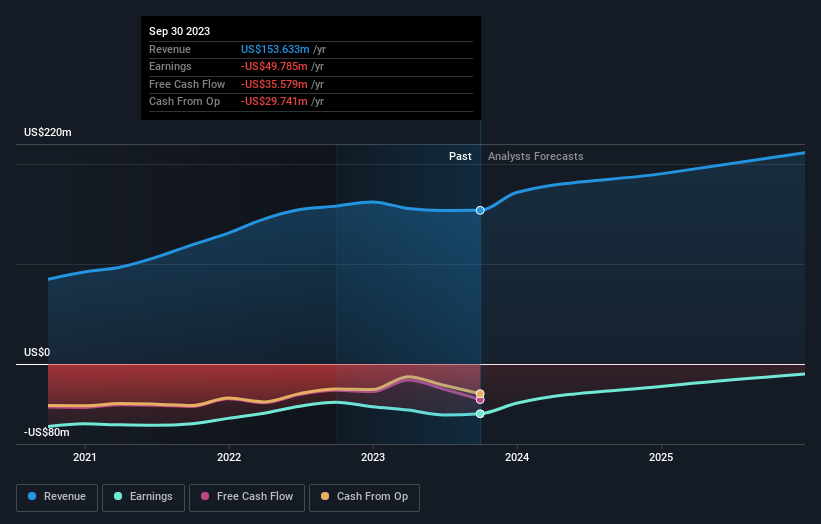Positive week for Cerus Corporation (NASDAQ:CERS) institutional investors who lost 54% over the past year
Key Insights
Significantly high institutional ownership implies Cerus' stock price is sensitive to their trading actions
A total of 9 investors have a majority stake in the company with 51% ownership
If you want to know who really controls Cerus Corporation (NASDAQ:CERS), then you'll have to look at the makeup of its share registry. We can see that institutions own the lion's share in the company with 67% ownership. That is, the group stands to benefit the most if the stock rises (or lose the most if there is a downturn).
Institutional investors would probably welcome last week's 32% increase in share prices after a year of 54% losses as a sign that returns are likely to begin trending higher.
In the chart below, we zoom in on the different ownership groups of Cerus.
View our latest analysis for Cerus
What Does The Institutional Ownership Tell Us About Cerus?
Institutions typically measure themselves against a benchmark when reporting to their own investors, so they often become more enthusiastic about a stock once it's included in a major index. We would expect most companies to have some institutions on the register, especially if they are growing.
Cerus already has institutions on the share registry. Indeed, they own a respectable stake in the company. This implies the analysts working for those institutions have looked at the stock and they like it. But just like anyone else, they could be wrong. If multiple institutions change their view on a stock at the same time, you could see the share price drop fast. It's therefore worth looking at Cerus' earnings history below. Of course, the future is what really matters.
Investors should note that institutions actually own more than half the company, so they can collectively wield significant power. It would appear that 8.9% of Cerus shares are controlled by hedge funds. That catches my attention because hedge funds sometimes try to influence management, or bring about changes that will create near term value for shareholders. Looking at our data, we can see that the largest shareholder is ARK Investment Management LLC with 11% of shares outstanding. Meanwhile, the second and third largest shareholders, hold 8.9% and 7.7%, of the shares outstanding, respectively. In addition, we found that William Greenman, the CEO has 1.0% of the shares allocated to their name.
We also observed that the top 9 shareholders account for more than half of the share register, with a few smaller shareholders to balance the interests of the larger ones to a certain extent.
While it makes sense to study institutional ownership data for a company, it also makes sense to study analyst sentiments to know which way the wind is blowing. There are a reasonable number of analysts covering the stock, so it might be useful to find out their aggregate view on the future.
Insider Ownership Of Cerus
The definition of an insider can differ slightly between different countries, but members of the board of directors always count. Management ultimately answers to the board. However, it is not uncommon for managers to be executive board members, especially if they are a founder or the CEO.
Insider ownership is positive when it signals leadership are thinking like the true owners of the company. However, high insider ownership can also give immense power to a small group within the company. This can be negative in some circumstances.
Shareholders would probably be interested to learn that insiders own shares in Cerus Corporation. In their own names, insiders own US$10m worth of stock in the US$313m company. This shows at least some alignment. You can click here to see if those insiders have been buying or selling.
General Public Ownership
With a 21% ownership, the general public, mostly comprising of individual investors, have some degree of sway over Cerus. This size of ownership, while considerable, may not be enough to change company policy if the decision is not in sync with other large shareholders.
Next Steps:
While it is well worth considering the different groups that own a company, there are other factors that are even more important. Consider risks, for instance. Every company has them, and we've spotted 3 warning signs for Cerus you should know about.
But ultimately it is the future, not the past, that will determine how well the owners of this business will do. Therefore we think it advisable to take a look at this free report showing whether analysts are predicting a brighter future.
NB: Figures in this article are calculated using data from the last twelve months, which refer to the 12-month period ending on the last date of the month the financial statement is dated. This may not be consistent with full year annual report figures.
Have feedback on this article? Concerned about the content? Get in touch with us directly. Alternatively, email editorial-team (at) simplywallst.com.
This article by Simply Wall St is general in nature. We provide commentary based on historical data and analyst forecasts only using an unbiased methodology and our articles are not intended to be financial advice. It does not constitute a recommendation to buy or sell any stock, and does not take account of your objectives, or your financial situation. We aim to bring you long-term focused analysis driven by fundamental data. Note that our analysis may not factor in the latest price-sensitive company announcements or qualitative material. Simply Wall St has no position in any stocks mentioned.


